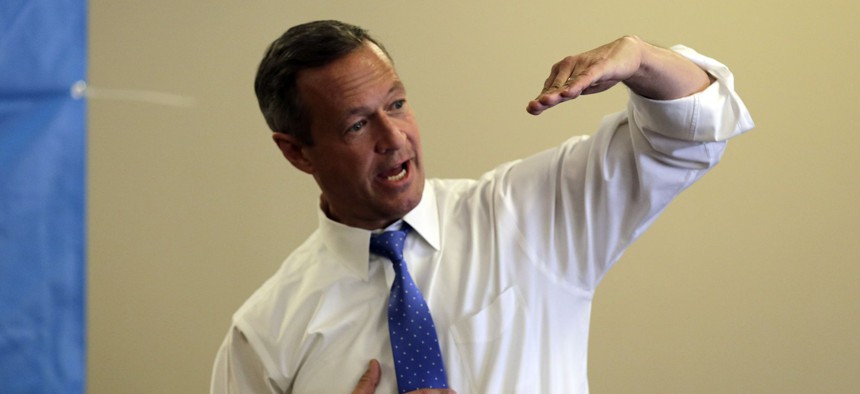Former Maryland Gov. Martin O’Malley Has a New Smart Cities Gig

Former Maryland Gov. Martin O'Malley on the presidential campaign trail in New Hampshire in January. Charles Krupa / AP Photo
O’Malley will oversee an advisory committee for the MetroLab Network.
Former Maryland Gov. Martin O’Malley is joining a group of local governments and universities collaborating to incorporate data, analytics and other innovations into municipal programs.
The so-called MetroLab Network was launched last year and includes more than 30 partnerships between city and county governments and universities. O’Malley will serve as a senior fellow with the group, and will chair an advisory committee that will include leaders from government, industry, academia and philanthropic organizations.
MetroLab Network issued an announcement on Thursday about O’Malley’s new position with the group.
“Advances in technology, data science, and computing provide new opportunities to deal with our cities’ greatest challenges: aging infrastructure, the delivery of effective public services, the need to help our most vulnerable neighbors, and the imperative to address climate change,” the former Democratic governor said in a statement. “By pairing cities with universities, MetroLab Network creates a collaborative platform that is a critical to deploying solutions.”
O’Malley served two terms as governor of Maryland between 2007 and 2015. Before that, he was the mayor of Baltimore from 1999 until 2007. After a poor showing in the Feb. 1 Iowa caucuses, he suspended his bid for the Democratic presidential nomination.
For his work with MetroLab Network, O’Malley will receive pay, but Ben Levine, interim director for the group, would not disclose the amount.
During his time as governor and mayor, O’Malley championed data-driven initiatives focused on improving decision-making and transparency, including CitiStat in Baltimore. A program he spearheaded as governor, known as StateStat, was reworked last year by current Gov. Larry Hogan, a Republican.
Levine explained that the advisory group O’Malley will chair will be geared toward providing a set of people who have experience at senior levels of government, and other enterprises, who can provide guidance and feedback to jurisdictions and universities within the network.
“What we’re trying to achieve as an organization is to create a coordinated approach across the country, as cities and universities tackle these sorts of smart cities, urban science kind of questions," Levine said.
MetroLab Network currently has $1 million in grant-funded backing from the John D. and Catherine T. MacArthur Foundation.
Its members include 34 cities, three counties and 44 universities.
Among the partnerships: Austin, Texas and the University of Texas; Detroit and Wayne State University; South Bend, Indiana and the University of Notre Dame; New York City and New York University; and Pittsburgh and Carnegie Mellon University.
One example of a project within the network is Atlanta’s work with the Georgia Institute of Technology to deploy a limited number of sensors on city property, like lights and buildings, which are designed to collect real-time data on the city’s environment and infrastructure.
“There is tremendous potential for what cities and universities can achieve together to improve the quality of life for our residents,” Seattle Mayor Ed Murray said in a statement Thursday, in response to O’Malley’s selection as a MetroLab fellow. “It is up to cities to become innovation leaders, and to test new ideas and new approaches to public policy issues.”
PREVIOUSLY on Route Fifty:
Bill Lucia is a Reporter for Government Executive's Route Fifty.
NEXT STORY: Countering drones via radio frequency






